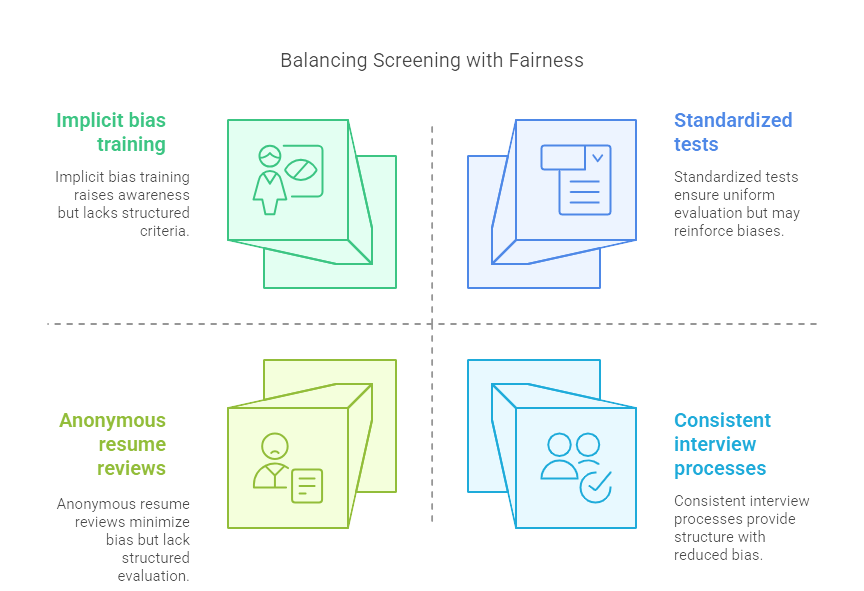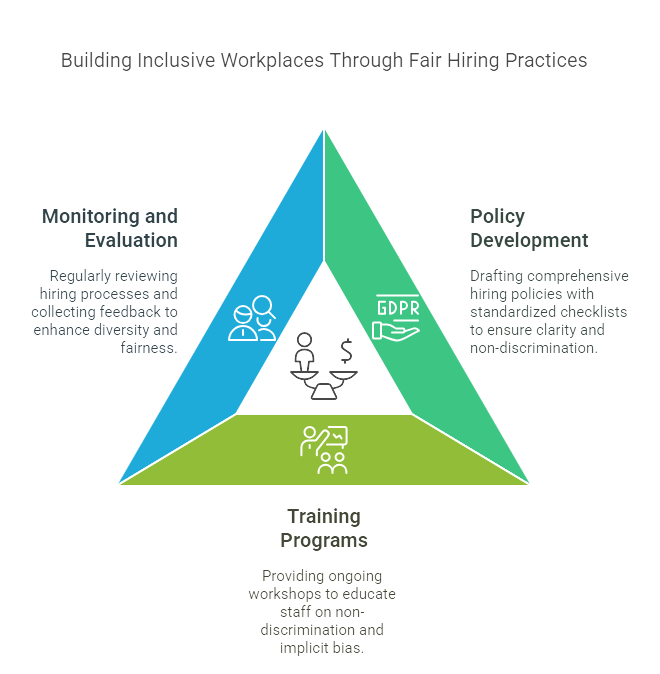Navigating the intricacies of hiring is a challenging aspect of any business. Striking a balance between thorough screening and maintaining fair hiring practices is crucial for fostering an inclusive and equitable workplace. This guide provides an in-depth look at how businesses can implement effective screening processes while adhering to principles of fairness and non-discrimination.
Key Takeaways
- Fair hiring practices are essential for fostering a diverse, inclusive, and dynamic workplace that benefits both the organization and its employees.
- Using thorough yet judicious screening tools, such as background checks, reference checks, and skill assessments, supports a fair evaluation process.
- Implementing non-discrimination policies, Equal Opportunity Employment (EOE) principles and bias-free job descriptions ensures an equitable hiring process.
- Balancing objective criteria, process consistency, and bias mitigation is crucial for maintaining fairness in candidate evaluations.
- Adhering to legal guidelines, such as the Fair Credit Reporting Act (FCRA), Americans with Disabilities Act (ADA), and Equal Employment Opportunity Commission (EEOC) recommendations, is vital for a compliant and fair hiring process.
Introduction
Creating a productive and diverse workplace hinges on one fundamental practice: fair hiring. It's not just a procedural necessity but a cornerstone of an inclusive, dynamic, and effective team. While thorough screening processes are essential for ensuring the right fit for your organization, they must be balanced with fair hiring practices that uphold equity and non-discrimination.
This guide walks business owners, HR professionals, recruiters, and job seekers through the nuanced interplay between rigorous screening and maintaining fairness in hiring. We'll unpack key aspects of effective screening tools and fair hiring practices, offering a blueprint for navigating this complex yet crucial aspect of talent acquisition.
In the following sections, we will delve into practical advice and legal insights, illuminating how to balance diligent candidate evaluation with the commitment to non-discriminatory practices. We aim to equip you with the knowledge and strategies necessary to foster an inclusive and legally compliant hiring process.

Importance of Fair Hiring Practices
Fair hiring practices are vital for creating a diverse and equitable workplace. They ensure that every candidate is evaluated based on qualifications, experience, and potential to contribute, free from bias or discrimination.
Fair hiring goes beyond legal compliance; it's about tapping into a broader talent pool, inevitably leading to more decadent ideas and perspectives. A diverse workplace is not merely ideal but a competitive advantage. Companies that actively practice fair hiring often see a boost in innovation, employee satisfaction, and overall company reputation. This inclusivity fosters a dynamic work environment that can adapt and thrive in a global market.
Fair hiring practices are legally governed to prevent discrimination based on race, gender, age, and disability. The Department of Labor provides guidelines to help employers ensure fair and compliant hiring processes. Ignoring these laws can result in severe consequences, both legally and in terms of brand reputation.
Ultimately, fair hiring practices aim to create a level playing field where the best talent wins. This approach not only strengthens an organization's moral fabric but also drives its long-term success.
EXPERT INSIGHT: To my co-HR practitioners: How easily do we get so focused on screening for skill that we end up neglecting the requirement for fairness? Working in different industries and helping organizations set up their talents for success, I have sat in rooms where fantastic talent was overlooked because the process hadn’t been set up to uncover them. Hiring fairly isn’t just about compliance; it’s about building a culture where talent gets uncovered, valued, and evaluated without bias. When we marry rigorous screening with fairness, we don’t just end up with better hires—we end up with better workplaces. It starts with intentions, and it continues with accountability. - Charm Paz, CHRP
Essential Screening Tools
When hiring, it's easy to get lost in the details. Yet, efficient use of screening tools can simplify the process. Here are the essentials:
Background Checks
Background checks are a cornerstone of the vetting process. They help verify that candidates have been truthful about their histories and credentials. Checking for criminal records, employment history, and education can save your company from future headaches. For example, confirming that a candidate has the degree they claim ensures you're not hiring under pretenses. Review typical questions and concerns through this handy guide.
Reference Checks
Getting insights from past employers can reveal much about a candidate's work ethic and performance. It’s not just about checking boxes but understanding how someone operated in their previous roles. Direct conversations can uncover strengths or potential red flags that might not be visible on a resume or during an interview.
Skill Assessments
Evaluating a candidate’s actual job-related skills is crucial. Whether through coding tests, writing assignments, or practical tasks, skill assessments show whether the person can perform the job. They're precious for technical positions, offering a glimpse into a candidate's proficiency and fit.
Each tool has its place, but using it judiciously and transparently supports a fair hiring process. Balancing thoroughness with fairness ensures you’re bringing the best people onboard correctly.

Implementing Fair Hiring Practices
Implementing fair hiring practices ensures that every candidate is given an equal opportunity based on their qualifications and experience rather than factors unrelated to their job performance. Here’s how to integrate fairness into your hiring process:
- Non-Discrimination Policies: Start by establishing robust non-discrimination policies that comply with relevant laws. Federal regulations, such as those outlined by the Federal Trade Commission (FTC), provide comprehensive guidance on fair background checks. Make these policies clear and accessible to everyone involved in the hiring process.
- Equal Opportunity Employment (EOE): Embrace the principles of Equal Opportunity Employment to remove any biases from the hiring process. EOE dictates that no applicant should face discrimination based on race, gender, age, religion, or other protected characteristics. It's not just a legal requirement but a moral imperative to ensure your workplace is inclusive.
- Bias-Free Job Descriptions: Craft job descriptions that are inclusive and free of biased language. Avoid gender-specific terms unless they are job-related, and ensure the qualifications listed focus on the skills and experience necessary for the job. A few tweaks here and there can make your postings more appealing to a diverse pool of candidates.
By adopting and consistently applying these practices, businesses can foster a hiring environment that values diversity and inclusivity and ensures every candidate is evaluated on merit.
Balancing Screening with Fairness
Objective Criteria
Creating and adhering to objective criteria is paramount. When you define clear parameters for what qualifies a candidate, you remove the guesswork and potential biases that can creep into subjective evaluations. Draft a checklist that aligns precisely with the job requirements. For instance, list specific qualifications, relevant experiences, and the professional skills needed. This structured approach ensures every candidate is measured against the same yardstick, promoting transparency and fairness.
Consistency in Process
Uniformity in screening processes across all candidates reinforces fairness. Ensure that every applicant undergoes the same evaluation stages—from the initial resume review to the final interview. Standardize your interview questions and assessment tools. For example, if you're using a technical test or a role-playing scenario, ensure every candidate faces the identical challenge. Document each step to maintain a verifiable trail of fairness.
Avoiding Implicit Bias
Implicit bias is an unseen, often subconscious barrier to fair hiring. Counteracting these biases begins with awareness. Implement mandatory training sessions for your hiring team focused on recognizing and mitigating implicit biases. Utilize technological tools designed for unbiased assessments—such as anonymous resume reviews—to concentrate purely on qualifications without the influence of names, schools, or backgrounds. You create a more equitable hiring process by actively acknowledging and addressing these biases.
In essence, striking the right balance between thorough screening and fair hiring involves establishing clear, consistent criteria and diligently working to minimize inherent biases. This balanced approach meets legal obligations and fosters a more diverse and inclusive workplace.

Legal Considerations
Fair Credit Reporting Act (FCRA)
The Fair Credit Reporting Act is foundational in regulating how businesses conduct background checks. This federal law mandates that employers obtain written consent from candidates before performing a background check. Additionally, if any adverse action—such as not hiring the candidate—is based on the background check, the employer must provide the candidate with a notice, a copy of the report, and a summary of their rights under the FCRA. Not adhering to FCRA guidelines can result in legal consequences, including fines and damages.
Americans with Disabilities Act (ADA)
The Americans with Disabilities Act protects candidates with disabilities from discrimination throughout the hiring process. Under the ADA, employers must provide reasonable accommodations during both the recruitment and employment phases unless doing so would cause undue hardship. This means pre-employment screenings must be accessible, and an employer cannot inquire about an applicant's disability before making a job offer. Any testing must be relevant to the job and administered in a way that accurately reflects the applicant's abilities.
Equal Employment Opportunity Commission (EEOC)
The EEOC enforces federal laws prohibiting employment discrimination. This body ensures that all candidates are treated equally during the hiring process, regardless of race, color, religion, sex, national origin, age, disability, or genetic information. The EEOC provides guidelines to help employers avoid discriminatory practices, highlighting important areas such as job advertisements, application forms, and interviews. Employers must consistently apply the same criteria and procedures to all candidates to ensure compliance and foster a fair hiring environment. Ignoring EEOC guidelines could result in legal challenges and significant financial penalties.
Best Practices for Business Owners and HR Professionals
Crafting fair hiring practices that also leverage effective screening tools requires thoughtful policy development and ongoing commitment. Here are practical steps to ensure your hiring process is both rigorous and equitable.
Policy Development
Drafting comprehensive hiring policies is crucial. These policies should explicitly spell out the steps in your hiring process, criteria for candidate evaluation, and methods for ensuring non-discrimination. Consider implementing a standardized hiring checklist that all team members follow to remove any ambiguity.
Training Programs
Consistent training is vital to maintaining fair hiring practices. Provide regular workshops and sessions on topics such as non-discrimination, implicit bias, and the legal requirements of fair hiring. Make sure these training programs are not just one-time orientations but ongoing efforts integrated into your yearly HR strategy.
Monitoring and Evaluation
Regularly review your hiring processes to ensure they remain effective and fair. This involves not just checking if policies are being followed but also collecting feedback from new hires and candidates about their experience. Implement metrics to track diversity and inclusiveness within your hiring funnel. Use this data to make adjustments and improvements where necessary.
By focusing on these areas, businesses can ensure they are not only compliant with laws and regulations but also fostering a diverse and inclusive workplace that benefits everyone.

Frequently Asked Questions (FAQ)
Knowing what fair hiring entails will help your hiring process be both compliant and inclusive. Whether you're an HR representative, business manager, or hiring manager, knowing how to handle legal compliance and reduce bias will impact your hiring process significantly. To help in your endeavor, we've compiled a series of frequently asked questions on the fundamentals of fair hiring—ranging from equal opportunity compliance and background checks through reducing bias and preventing legal pitfalls. Not only will these answers make your process work, but they will also render it respectful and inclusive for everyone applying.
What constitutes a fair hiring process?
A fair hiring process ensures that all candidates are evaluated based on objective criteria and relevant qualifications without discrimination. This includes following legal guidelines, implementing unbiased screening tools, and maintaining transparency throughout the hiring stages.
Can background checks be conducted without violating equal opportunity laws?
Yes, background checks can be conducted in compliance with equal opportunity laws by adhering to the Fair Credit Reporting Act (FCRA) and other relevant regulations. This means obtaining proper consent from candidates, ensuring the information gathered is job-related, and providing candidates with the right to dispute or correct information found during the checks.
How can implicit bias be minimized in the hiring process?
Minimizing implicit bias involves training hiring managers to recognize their own biases, using structured interviews with standardized questions, and employing diverse hiring panels. Additionally, leveraging technology such as anonymized resume screening tools can further reduce the impact of unconscious biases.
What are the consequences of not adhering to fair hiring practices?
Failing to maintain fair hiring practices can lead to legal consequences, including lawsuits and fines from bodies such as the Equal Employment Opportunity Commission (EEOC). Beyond legal ramifications, businesses may suffer from reputational damage, decreased employee morale, and a less diverse workforce, which can impair overall business performance.
Conclusion
Balancing the act of thorough screening with the imperative of fair hiring is not just a legal obligation, but a pathway to creating a dynamic and inclusive workplace. We've traversed various facets of this balancing act, from understanding the significance of fair hiring practices and essential screening tools to navigating legal considerations and establishing best practices for consistency and objectivity.
Maintaining an unbiased hiring process is an ongoing commitment that requires persistent effort. This not only includes adherence to non-discriminatory practices but also the proactive endeavor to educate oneself and one's team regularly. By fostering conscious awareness in every step of the hiring process, businesses can ensure they are not just compliant with laws but are also champions of workplace diversity and equality.
The journey towards a balanced hiring process is continuous, demanding vigilance and dedication. As employers, HR professionals, and recruiters, we must stay informed and act with integrity, ensuring a hiring process that upholds fairness and inclusivity at its core. The effort invested in creating an equal opportunity workplace reaps benefits far beyond legal compliance, manifesting in not just a diverse and satisfied workforce but an overall enhanced company reputation.
So, let's strive for excellence in hiring, continually educate ourselves, and lead by example in fostering a culture of fairness and equity. Your next step? Dive deep into best practices, refine your policies, and train your teams. Make fair hiring not just a goal, but a standard.

